Recently, Don and I were discussing the intricacies of cryptocurrencies. We agreed neither of us really understand these assets, and therefore (even if we had the money to do so) they would make lousy investments for us. But, it being winter and therefore since he's spending more time at the computer, Don decided to try and get a handle on cryptocurrencies in expectation of justifying our initial thoughts.
In the wake of the whole Sam Bankman-Fried scandal, there are a lot of others questioning the wisdom of investing in cryptocurrencies. But, like every other financial bubble in the past, many people got caught up in the frenzy, tragically sunk their life savings into it, and got wiped out. (Remember the tulip mania bubble?)
That's the problem with non-tangible investments, you see. At least tulips are real; but what is a Bitcoin, really? Or an Etherium or Dogecoin or any of the literally thousands of other cryptocurrencies out there (over 9,000 varieties as of a recent count)? Do they truly exist and have actual value, or are they simply computer algorithms that people became convinced are actually worth something? I mean, fiat currency (like the dollar, created and guaranteed by the U.S. government) is only valuable because there is a group-think agreeing it's valuable; but at least such currencies have a long history as a means of exchange. But with cryptocurrencies, any "value" seemingly comes out of thin air.
There are other problems associated with cryptocurrencies. Aside from the fact that their only value rests on finding someone who will buy them from you (hopefully for more than you paid), they represent ... nothing. They're not "backed" by anything (labor, precious metals, or even "the full faith and credit of the United States government"). Their continued existence depends upon the indifference of controlling legal authorities, and that indifference can be shattered pretty quickly as soon as a government decides it's not getting its "cut."
The prime example of this – and the model for the coming regulation-to-destruction of the private crypto market – is the actions of China, which has made the trade, transfer, creation, and holding of all cryptocurrencies illegal. Why would China do this? For the same reasons that will soon be coming to your neighborhood: too much undocumented financial freedom in the hands of the citizens and not enough fiscal control for our public servants.
The other shortcomings of cryptocurrencies are important, such as the wild booms-and-busts that can occur when someone like Elon Musk says that Tesla will accept crypto, then changes his mind a few months later. Or that fact that crypto-mining uses more electricity per year that the nation of Finland. Or that something like 80 percent of all cryptocurrencies have failed, leaving tens of thousands of investors broke.
This is why we've never liked the idea of cryptocurrencies or other intangibles, and have always been keen on tangible investments. As the saying goes, you can't eat gold or silver; so our preferred tangible investments involve things that reproduce (cows, chickens) or can be saved and regrown (fruits and vegetables). Among these tangible investments we include owning our small farm and the woodworking business. Each of these assets can (and do) produce income if managed correctly – something that cryptocurrencies simply can't do.
Don and I have always been outside-the-box thinkers. Our notion of "investing" is far from conventional. During our younger years, we were so busy building the woodcraft business that we had no spare income to "invest" in traditional options such as retirement plans and the stock market. Now that we're more financially stable, we know nothing about these intangible investments and don't feel comfortable putting our hard-earned money someplace we don't understand (and, in the wake of the Sam Bankman-Fried scandal, apparently a lot of other people don't understand it either).
So what, to us, is a "tangible" investment? Quite simply it's something that allows us to cut our expenses still further. Cows, for example, will cost money at first, but then they'll save us money (on meat and dairy products). Ditto with chickens. We invest in lumber and other building supplies against future projects that will contribute toward self-sufficiency. We invest in fruit trees and blueberry bushes so we won't have to buy fruit. We invest in materials for garden beds so we won't have to buy vegetables.
In short, anything that allows us to stay home and provide for our own needs is a "tangible investment" in our book.
How about you?

.jpg)
.jpg)

































































